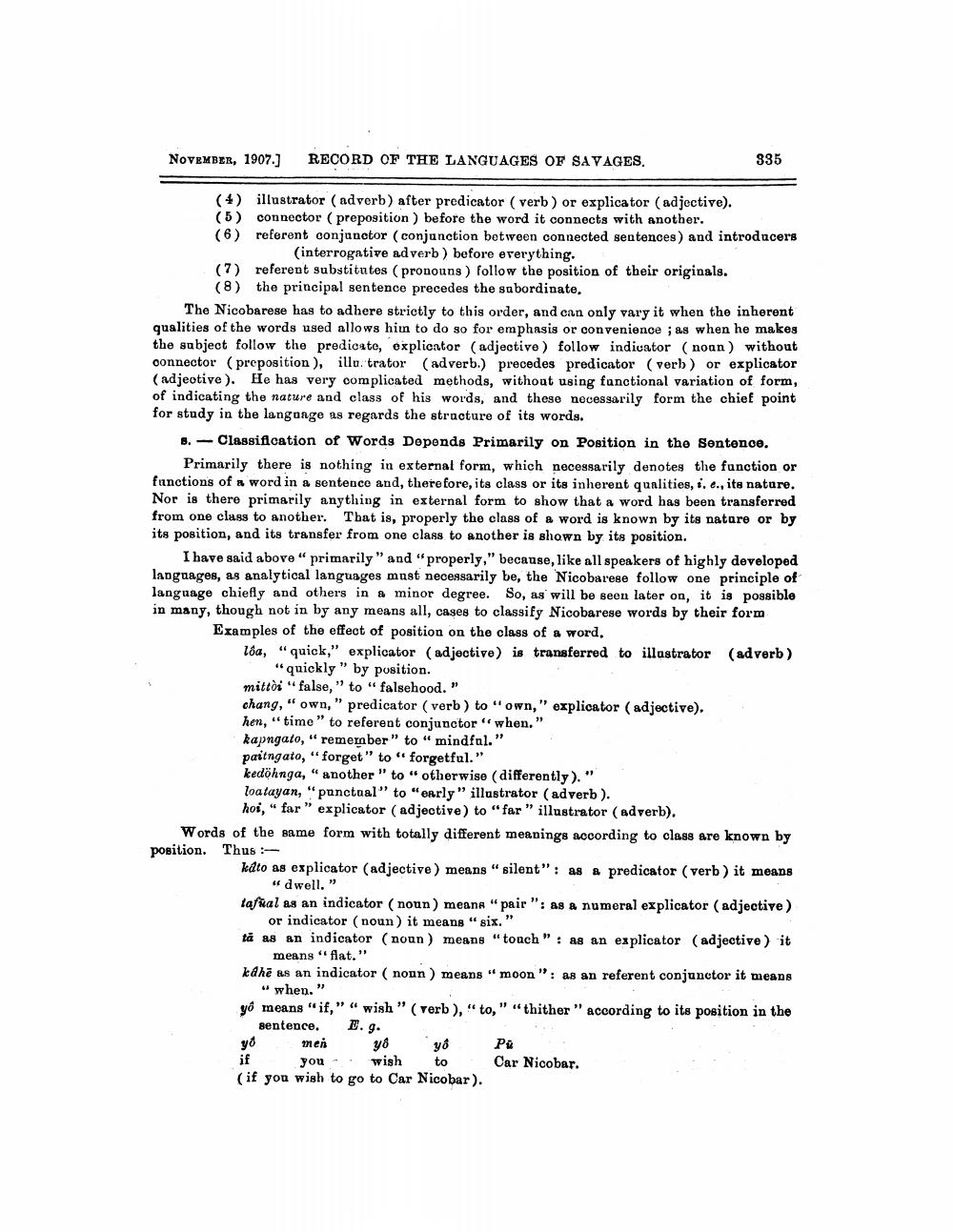________________
NOVEMBER, 1907.)
RECORD OF THE LANGUAGES OF SAVAGES.
335
(4) illustrator (adverb) after predicator ( verb ) or explicator (adjective). (5) connector (preposition ) before the word it connects with another. (6) referent conjunctor (conjunction between connected sentences) and introducers
(interrogative adverb ) before everything. (7) referent substitutes (pronouns) follow the position of their originals.
(8) the principal sentence precedes the subordinate. The Nicobarese has to adhere strictly to this order, and can only vary it when the inherent qualities of the words used allows him to do so for emphasis or convenience; as when he makes the subject follow the predicate, explicator (adjective) follow indicator (noun) without connector (preposition), illo trator (adverb.) precedes predicator (verb) or explicator (adjeotive). He has very complicated methods, without using fanctional variation of form, of indicating the nature and class of his words, and these necessarily form the chief point for study in the language as regards the stracture of its words.
B. - Classifloation of Words Dopends Primarily on Position in tho Sontence.
Primarily there is nothing in external form, which necessarily denotes the function or functions of a word in a sentence and, therefore, its class or its inherent qualities, i, e., its nature. Nor is there primarily anything in external form to show that a word has been transferred from one class to another. That is, properly the class of a word is known by its nature or by its position, and its transfer from one class to another is shown by its position.
I have said above“ primarily" and "properly," because, like all speakers of highly developed languages, as analytical languages must necessarily be, the Nicobarese follow one principle of language chiefly and others in a minor degree. So, as will be seen later on, it is possible in many, though not in by any means all, cases to classify Nicobarese words by their form
Examples of the effect of position on the class of a word, loa, "quick," explicator (adjective) is transferred to illustrator (adverb)
"quickly" by position. mittòi "false, "to "falsehood." chang, "own," predicator (verb) to "own," explicator (adjective). hen, "time" to referent conjunctor" when." kapngato," remeraber" to "mindful." paitngato, "forget" to "forgetful." kedöhnga, "another" to "otherwise (differently)." loatayan," punctual" to "early" illustrator (adverb ).
hoi, " far" explicator (adjective) to "far" illustrator (adverb). Words of the same form with totally different meanings according to class are known by position. Thus
kato as explicator (adjective) means "silent": as a predicator (verb) it means
"dwell." tafval as an indicator (noun) means "pair": as a numeral explicator (adjective)
or indicator (noun) it means "six." tä as an indicator (noun) means "touch" : as an explicator (adjective) it
means "flat." kdhë as an indicator (noun) means "moon": as an referent conjunctor it means
when." yô means "if," "wish” (verb), " to,” “thither" according to its position in the
sentence. E. g. yo men yo yố På if you wish to Car Nicobar. (if you wish to go to Car Nicobar).




